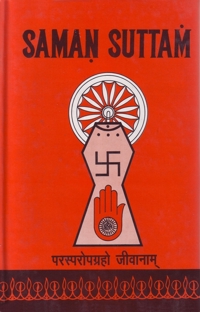28. Tapa Sutra
(A) BAHYA TAPAPRECEPTS ON PENANCE
(B) ABHYANTARA TAPAExternal Penance
Jattha kasayaniroho, bambham jinapuyanam anasanam ca.
So savvo ceva tavo, visesao muddhaloyammi. (439)Everything celibacy, worship of Jina and fasting done to check the passions is penance;specially according to the simple people. (439)
So tavo duviho vutto, bahirabbhamtaro taha.
Bahiro chavviho vutto, evamabbhamtaro tavo. (440)That penance is said to be of two types viz., external and internal. The external penance is again of six types, and so is internal penance. (440)
Anasanamunoyariya, bhikkhayariya ya rasapariccao.
Kaakileso samlinaya ya, bajjho tavo hoi. (441)(1) Fasting, (2) eating less than one.s normal diet, (3) begging for alms (4) giving up of delicacies. (5) mortification of body, (6) lonely residence, these are the external penances. (441)
Kammana nijjarattham, aharam pariharei lilae.
Egadinadipamanam, tassa tavam anasanam hodi. (442)He who voluntarily gives up food for a day or so, for purging the soul from Karmas practises the external penance of fasting. (442)
Je payanubhattapana, suyaheu te tavassino samae.
Jo a tavo suyahino, bahirayo so chuhaharo. (443)A monk who takes a little food for undertaking study of scriptures is said to be a tapasvi (i.e., one practising the penance), according to scriptures. The penance of fasting without scriptural study amounts only to starving. (443)
So nama anasanatavo, jena mano.mamgulam na cittei.
Jena na imdiyahani, jena ya joga na hayamti. (444)Fasting is penance when the person observing it does not entertain any inauspicious thoughts, when it does not result in bodily weakness, and when the activities of mind, speech and body remain unimpaired. (444)
Balam thamam ca pehatye, saddhamaroggamappano.
Khettam kalam ca vinnaya, tahappanam nijumjae. (445)A person should decide upon fasting after taking into consideration his physical strength, stamina, faith, state of health, place and time. (445)
Uvasamano akkhanam, uvavaso vannido samasena.
Tamha bhumjamta vi ya, jidimdiya homti uvavasa. (446)In short, subjugation of senses is also described as fasting; therefore those who have conquered their senses are said to be fasting, though they maybe taking food. (446)
Chatthatthamadasamaduvalasehim, abahusuyassa ja sohi.
Tatto bahutaraguniya, havijja jimiyassa nanissa. (447)The purity (of self) achieved by one who is wellversed in scriptures, though regularly takes food, would be many times more than the purity of a person who is ignorant of scriptures, though he may fast for two, three, four or five days. (447)
Jo jassa u aharo, tatto omam tu jo kare.
Jahannenegastthai, evam davvena u bhave. (448)A person, who takes food less even by a morsel than his usual diet, is said to practise penance called formal unodari (partial fasting). (448)
Goyarapamanadayaga-bhayanananavidhana jam gahanam.
Taha esanassa gahanam, vividhassa ya vuttiparisamkha. (449)If one procures alms after having taken various sorts of decisions as to their amount, their donor, their containing-vessel or as to their various types of contents, one performs the penance called vittiparisankhyana i. e. limiting the things begged for. (449)
Khiradahisappimai, paniyam panabhoyanam.
Parivajjanam rasanam tu, bhaniyam rasavivajjanam. (450)A monk who avoids delicious food like milk, curds, butter and taking his food on leaf, practises the penance of rasaparityaga (renunciation of delicious dishes). (450)
Egamtamanavae, itthipasuvivajjie.
Sayanasanasevanaya, vivittasayanasanam. (451)The penance of having his bed and seat in a solitary and unfrequented place, shunned by women and animals, is called Viviktasayyasana (i.e. solitary residence). (451)
Thana virasanaiya, jivassa u suhavaha.
Ugga jaha dharijjamti, kayakilesam tamahiyam. (452)Adapting harsh bodily postures like virasana etc. which cause bliss in a soul, constitute the penance called kayaklesa (mortification of body). (452)
Suhena bhavidam nanam, duhe jade vinassadi.
Tamha jahabalam joi, appa dukkhehi bhavae. (453)The knowledge acquired at a time when one experiences convenience vanishes away when one begins to experience inconvenience. Hence (at the time of acquiring knowledge) a yogin ought to put himself to inconvenience keeping in mind his capacity for tolerance. (453)
Na dukkham na sukham va vi, jahahetu tigicchiti.
Tigicchie sujuttassa, dukkham va jai va suham.
Mohakkhae u juttassa, dukkham va jai va suham.
Mohakkhae jahaheu, na dukkham na vi va suham. (454 & 455)Neither an experience of pain nor an experience of pleasure is an appropriate cause for curing an ailment but one who conducts one.s life well, gets cured either by way of pain or by way of pleasure. Likewise, one engaged in putting an end to one.s delusion might experience either pain or pleasure but neither pain nor pleasure is what puts an end to one.s delusion. (454 & 455)
Inward Penance
Payacchittam vinao, veyavaccam taheva sajjhavo.
Jhanam ca viussaggo, eso abbhimtaro tao. (456)Internal penance is (of six kinds): (1) Atonement for sins, (2) humility, (3) serving his preceptor, (4) self-study of scriptures (5) meditation and (6) Steadiness of body while in meditation. (456)
Vada-samidi-sila-samjama-parinamo karananiggaho bhavo.
So havadi payacchittam, anavarayam ceva kayavvo. (457)The effects of observance of a vow, carefulness, continence, self-control and subjugation of the senses, these bring about atonement; they are to be practised incessantly. (457)
Kohadi-sagabbhava-kkhayapahudi-bhavanae niggahanam.
Payacchittam bhanidam, niyagunacimta ya nicchayado. (458)Thinking of controlling anger and other thoughts, passification of intense thoughts, contemplation of one.s own virtues, these constitute atonement from the real view-point. (458)
Namtanamtabhavena, samajjia-suhaasuhakammasamdoho.
Tavacaranena vinassadi, payacchittam tavam tamha. (459)The multitude of auspicious and in-auspicious Karmas accumulated during endless transmigration can be destroyed by practice of penances; so, the atonement (expiation) is called the penance. (459)
Aloyana padikamanam, ubhayavivego taha viussaggo.
Tava chedo mulam vi ya, pariharo ceva saddahana. (460)Confession, repentance, both confession and repentance, judicious discrimination, renunciation, penance, partial reduction of seniority, absolute exclusion for a particular time from sangh and reiteration of faith (i.e. absolute exclusion) (these ten constitute atonement). (460)
Anabhogakidam kammam, jaam kim pi manasa kadam.
Tam savvam aloccejja hu, avvakhittena cedasa. (461)An evil act done unintentionally or intentionally all this has to be confessed with an unperturbed mind. (461)
Jaha balo jampanto, kajjamakajjam ca ujjuyam bhanai.
Tam taha aloijja, mayamayavippamukko vi. (462)Just as a child speaks of its good and bad acts in a straight-forward manner, similarly one ought to confess one.s guilt with a mind free from deceit and pride. (462)
Jaha kamtaena viddho, savvamge veyanaddio hoi.
Taha ceva uddhiyammi u, nissallo nivvuo hoi.
Evamanuddhiyadoso, maillo tenam dukkhio hoi.
So ceva cattadoso, suvisuddho nivvuo hoi. (463 & 464)He who is pricked by a thorn feels the pain all over his body (but) becomes free from such pain when the thorn is removed. Similarly, he who hides his faults fraudulently, becomes miserable; he who confesses his faults honestly becomes pure and free from mental affliction. (463 & 464)
Jo passadi appanam, samabhave samthavittu parinamam.
Aloyanamidi janaha, paramajinamdassa uvaesam. (465)He who realises his own soul after attaining mental equanimity achieves confession, know this to be the advice of the supreme Jina. (465)
Abbhutthanam amjalikaranam, tahevasanadayanam.
Gujnbhattibhavasussusa, vinao esa viyahio. (466)To get up at the arrival of an elder to welcome him with folded hands, to offer him (an honoured) seat, to serve him with feeling of devotedness, these constitute humility. (466)
Damsananane vinao, carittatava-ovacario vinao.
Pamcaviho khalu vinao, pamcamagainaigo bhanio. (467)Humility is of five kinds; humility in faith, in knowledge, in conduct, in penance and in decorum or etiquette, these lead to liberation, i.e. the fifth state. (467)
Ekammi hiliyammi, hiliya humti te savve.
Ekammi puiyammi, puiya humti savve. (468)If one (elder) is insulted, it amounts to an insult to all; if one is venerated, all of them are venerated. (468)
Vinao sasane mulam, vinio samjao bhave.
Vinayao vippamukkassa, kao dhammo kao tavo? (469)Humility is the basic (virtue) according to Jaina scripture; a person of humility acquires self-restratint. Where is religion and where is penance to one who has lost humility? (469)
Vinao mokkhaddaram, vinayado samjamo tavo nanam.
Vinaenarahijjadi, airio savvasamgho ya. (470)Humility is the gateway to liberation; through humility one acquires self-restraint, penance and knowledge. By humility one honours the Acarya and the Sangh (i.e. the entire community of religious people). (470)
Vinayahiya vijja, demti phalam iha pare ya logammi.
Na phalamti vinayahina sassani va toyahinaim. (471)Learning acquied with humility proves fruitful in this world and in the other world; just as a plant cannot grow without water, learning will not be fruitful without humility. (471)
Tamha savvapayatte, viniyattam ma kadai chamdejja.
Appasudo vi ya puriso, khavedi kammani vinaena. (472)Therefore, one should not abandon humility at any cost. Even a person with less scriptural knowledge can annihilate his Karmas, if he has humility. (472)
Sejjogasanisejjo, tahovahipadilehanahi uvaggahide.
Aharosahavayana-vikimcanam vamdanadihim. (473)The service to a monk (vaiyavrttya) consists in providing him bed, residence, seat, proper cleaning of his implements etc. and then arranging for his food, medicine, a reading of scriptural text, a proper disposal of refuse with propers respect. (473)
Addhanatenasavada-rayanadirodhanasive ome.
Vejjavaccam uttam samgahasarakkhanovedam. (474)Offering protection to and taking care of a monk who becomes fatigued on his way, is threatened by a thief, a wild animal, a king or obstructed by river or gets afflicted by a contagious disease or famine, is service to a monk (vaiyavrttya). (474)
Pariyattana ya vayana, padicchananuvehana ya dhammakaha.
Thudimamgalasamjutto, pamcaviho hoi sajjhao. (475)Study of scriptures (svadhyaya) is of five kinds: (1) reading of scriptural text (2) questioning (3) repitition (4) pondering over and (5) narration of religious discourses opening with auspicious praise (of Jina). (475)
Puyadisu niravekkho, jina-sattham jo padhei bhattie.
Kammamala-sohanattham, suyalaho suhayaro tassa. (476)He who studies scriptures with devotion without any desire for personal praise and honour or purging of his Karmic pollution, will have the benefit of scriptural knowledge conducive to his happiness. (476)
Sajjhayam janamto, pamcimdiyasamvudo tigutto ya.
Hoi ya ekaggamano, vinaena samahio sahu. (477)A monk who has studied the scriptures keeps his five sense organs under control, practises the three guptis i.e. the control over one.s speech and body, concentrates his mind and observes humility. (477)
Nanena jjhanasijjhi, jhanado savvakammanijjaranam.
Nijjaranaphalam mokkham, nanabbhasam tado kujja. (478)Perfect meditation is attained through knowledge and destruction of Karmas by meditation; liberation is the fruit of destruction of Karmas; hence; one should be engaged constantly in acquisition of knowledge. (478)
Barasavihammi vi tave, abbhimtarabahire kusaladitthe.
Na vi atthi na vi ya hohi, sajjhayasamam tavokammam. (479)Among the twelve penances, internal and external which are experienced by one wise person, there si no penance, that equals or will be equal to the study of scriptures. (479)
Sayanasanathane va, je u bhikkhu na vavare.
Kayassa viussaggo, chattho so parikittio. (480)A monk who makes no movements of his body while sleeping, sitting or standing and checkes all activities of his body is said to observe the sixth penance of bodily steadines. (480)
Dehamaijaddasuddhi, suhadukkhatitikkhaya anuppeha.
Jhayai ya suham jhanam, egaggo kausaggommi. (481)The benefits of practising meditation with bodily steadiness are: removal of bodily and mental lethargy, development of capacity to bear pain as well as pleasure, aacquisition of deep reflection, and enhanced power of concentration in pure meditation. (481)
Tesim tu tavo na suddho, nikkhamta je mahakula.
Jam nevanne viyanamti, na silogam pavejjai. (482)The penance of those who are born in noble families and have renounced their homes will not be pure, if they practise it for praise and honour; those who desire to attain purity must practise penance unnoticed and without any desire for praise. (482)
Nanamayavayasahio, silujjalio tavo mao aggi.
Samsarakaranabiyam, dahai davaggi va tanarasim. (483)The fire of penance which is set ablaze by righteous character when combined with the wind of Right knowledge, will burn the seed of karma which is the cause of mundane existence, like a forest-fire which burns heap of grass. (483)
 Jinendra Varni
Jinendra Varni

